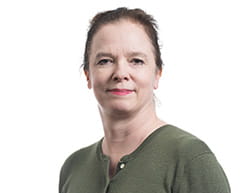Nuveen Real Estate is a global investment manager with a $139 billion real estate portfolio incorporating office, industrial, logistics, residential, retail, alternatives and other sectors.
“For us, social value is looking beyond the return on investment that buildings can deliver and looking as well at the role that those buildings can play in communities.” Abigail Dean, Nuveen.
While ESG has long been part of the business’ approach, the focus has been primarily on environmental considerations because of climate change.
While aiming to achieve net-zero carbon by 2040 is a key target developing considerations around social value has been more piecemeal.
But that is changing, says Abigail Dean, Head of Strategic Insights at Nuveen Real Estate: “We want to better understand what the social value of real estate is. And understand what our role is, as an owner of real estate, in promoting that. We are trying to develop a more formal, structured approach.”
Certain real estate has some obvious social usefulness, such as affordable housing, education and health facilities. But there are also the broader economic values buildings can bring to a community, for example, job creation, value enhancement for other investments, civic pride and improvements in health and well-being.
It is early days, and Dean admits that social value more broadly can be hard to capture. Certain projects lend themselves to social value measurements. The St James Quarter in Edinburgh is a good example. It’s a regeneration project Nuveen has been working on for ten years and involves transforming a run-down shopping centre into new retail, leisure, hotel and residential uses.
The initial steps were community engagement to determine how people felt about the existing building and what they’d like in its place. What sort of development would make it an area to enjoy rather than avoid? What would bring civic pride and tangible benefits to the community?
Then there was work on the wider economic impact for the local community. Dean says: “We had goals around the proportion of services and goods that are sourced locally to support existing businesses and set up a skills academy to give access to the jobs created when the centre opened.”
Local schools, colleges and universities were involved in the project to learn from the work being done. Students made regular site visits and got to know the project and project team well.
What Nuveen has learned from projects like St James Quarter is now being applied more generally across the portfolio. It is easier to do with regeneration projects, but the core business is investment and asset management. Nuveen holds buildings for 7-10 years on average.
“We are working on what social usefulness means and looks like and developing a rating system for each building,” says Dean. “And working out whether understanding that can help us to make improvements.”
Part of that process is thinking about the role of community management, particularly where a property manager is looking after several buildings. And not just the community within the building but the wider community.
It’s a practical and tangible measurement, assessing what on the ground initiatives could be introduced to enhance the role of the building and how it engages with the local community—and then measuring the success of those initiatives.
Dean says there are two key drivers for developing social and environmental value considerations alongside financial ones in its investment strategy. First, the investors, on whose behalf Nuveen invests, want to know their investment has a positive impact.
Secondly, it’s about future-proofing that investment. “While we can't yet prove this through the data, it is common sense to us that social value will equate to investment value,” she says.
“If a building is providing a useful function to local communities, it puts it at less risk of obsolescence. Therefore, enhancing social value is clearly a goal of good asset management.”
